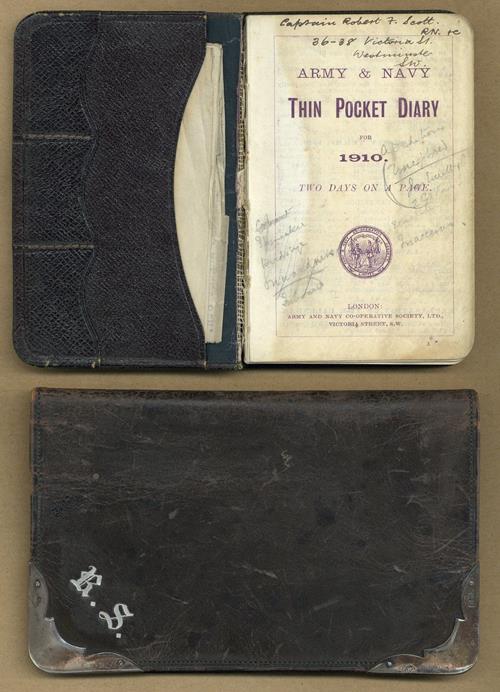
Auction: 16043 - Autographs, Historical Documents, Ephemera and Postal History
Lot: 87
Documents
Scott of the Antarctic
1910 Scott's pocket diary, Army & Navy Thin Pocket Diary with autograph ownership inscription on title "Captain Robert F. Scott. RN &c 36-38 Victoria St. Westminster SW".
The hitherto virtually unknown prequel to what is arguably, along with that of Samuel Pepys, the most famous diary in the English language. Scott’s pocket journal for his last months in England before his setting out on the ill-fated Terra Nova Expedition contains brief entries for more than half a year of intense preparation, with addresses and lists of names added on the concluding leaves. It offers a vivid, though elliptical, insight into the frantic pace of getting ready for the expedition, with which almost all the entries are in some way concerned.
The earliest, for 4 December 1909, notes "Interview Drs Wilson & Atkinson"; other appointments as the months go by include practical meetings at the Australian and New Zealand High Commissions, the Admiralty and the R.G.S. His departure for Norway is noted on 26 February, where on 1 March he is to "Go to furs people & sledges". Many of the entries reflect Scott’s preoccupation with the financing of the expedition, which takes him on tours to Middlesbrough, Manchester, Liverpool and elsewhere, and the necessary round of dinners, lectures and press calls.
As the date of the expedition’s departure approaches, on 27 April he notes "Medical Exam: for Officers", on 7 May "Ship including experiments" and on 26 May "Huntley & Palmers Directors visit Ship"; on 7 June: "Leave for Cardiff". Amongst the last entries are a series of valedictory audiences: 25 June "Audience Queen Alexandra", 5 July "11.0 Audience H.M. The King", etc. Among the concluding memoranda are a few notes of addresses of expedition members and suppliers, as well as scattered memoranda, including "send Wilson ‘Scurvy’" and the poignant "After the expedition a list of firms whose goods were taken and were found to be thoroughly satisfactory will be published".
Scott left England for the last time on 16 July, rejoining the Terra Nova in Cape Town. During the expedition to the South Pole, Scott kept a separate diary in which he recorded the hardships of the journey. He and four companions reached the pole on 17 January 1912, only to find that Amundsen’s Norwegian team had beaten them by 33 days. The entire party perished on the return journey from the pole. When Scott’s records were discovered with the bodies by a search party in November, it cemented the explorer’s role as English tragic hero. The famous diary, which helped shape the image of polar exploration, now rests in the British Library under the shelfmark Add. MS 51035. The present 1910 journal, little noted until now, a century after the event which came to be perceived in British collective consciousness as a magnificent failure of near-mythical proportions, provides an unsettling exposition to that legendary tragedy. – Includes a typed leaf "Approximate Programme of ‘Terra Nova’s’ movements" from "Leave London June 1st" to "Leave Lyttelton Novr. 15th", with some manuscript additions.
Also includes a gentleman’s leather wallet, stamped on upper cover with initials "R.S." with the visiting card of Viscount Knutsford loosely inserted, inscribed "This book belonged to Capt. Scott of S. Polar fame & was given to me by his son Peter".
Captain Robert Falcon Scott CVO RN (1868 – 1912) was a British Royal Navy officer and explorer who led two expeditions to the Antarctic regions: the Discovery Expedition, 1901–1904, and the ill-fated Terra Nova Expedition. Following the news of his death, Scott became a celebrated British hero, a status reflected by the many permanent memorials erected across the nation.
Subject to 20% VAT on Buyer’s Premium. For more information please view Terms and Conditions for Buyers.
Sold for
£16,000




